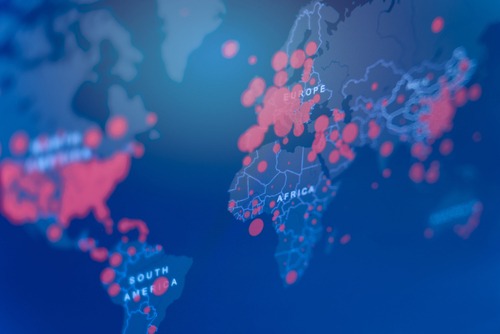
In facing down a future of potential biological dangers, a new report from authors at NTI | bio recommended concrete action at the national and international level, from new oversight agencies to process overhauls and funding, to improve prevention and response.
In “Strengthening Global Systems to Prevent and Respond to High-Consequence Biological Threats,” authors Dr. Jaime Yassif, Dr. Kevin O’Prey, and Christopher Isaac argued for five actions based on the results of a March 2021 tabletop exercise on high-consequence biological threats jointly hosted by NTI and the Munich Security Conference:
- Improve international systems for pandemic risk assessment, warning, and investigation of outbreak origins
- Create and implement national-level triggers to get ahead on pandemic response
- Found an international entity to reduce biological risks caused by rapid technology advances
- Develop a global health security fund to speed pandemic preparedness capacity building
- Launch an international process to cement supply chain resilience
“NTI recognizes the critical importance of strengthening the global biosecurity and pandemic preparedness architecture,” Dr. Margaret Hamburg, NTI interim vice president, said in the report. “Scientific and political leaders must take bold action to safeguard the global bioscience and biotechnology research and development enterprise to ensure that catastrophic accidents or deliberate misuse do not lead to the next global pandemic.”
The March exercise utilized a scenario defined by a deadly global pandemic sprouting from a strain of monkeypox virus erupting from a fictional nation. That virus proceeded to spread worldwide in 18 months, following its initial release by a terrorist attack, and ultimately killed more than 270 million people within the fictional scenario.
According to an NTI summary of the exercise, participants agreed that it highlighted the international system of pandemic prevention, detection, analysis, warning, and response is unable to meet current and anticipated future challenges. In that exercise, it was eventually uncovered that the pathogen used by terrorists was lab-engineered with inadequate biosafety and biosecurity provisions, supplemented by terrible oversight. In the real world, gasps in international preparedness and security are baked into the system, according to NTI, and undercut the ability of the international community to effectively respond to biological events like COVID-19.
The ominous result is that, eventually, the world could face something with even worse consequences than the ongoing pandemic and be unsuited to stopping it.
That exercise included 19 leaders and experts from Africa, America, Asia, and Europe.
“The world is unprepared to cope with severe global pandemics, and COVID-19 is a warning shot that has highlighted our shared vulnerability to these events,” Yassif said. “While decision-makers are rightly focused on saving lives and fostering economic recovery, now is also the time to strengthen our capabilities to prevent and respond to future high-consequence biological events, which could match the impact of COVID-19 or cause damage that is significantly more severe.”
As is, participants in the exercise warned of weak global detection, assessment, and warning systems for pandemic risks, major gaps in national-level preparedness and biological research governance, as well as a lack of funding for pandemic preparedness. National governments, they added, should work to develop pandemic response plans built on red lines that trigger prompt action, no matter the near-term cost. Likewise, the current system governing biological research is in sore need of an upgrade worldwide if it hopes to provide proper security.




